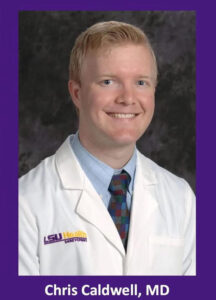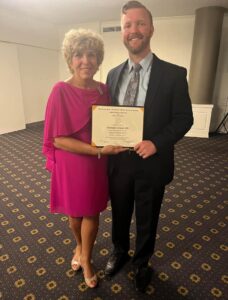Legion baseball: Journey from bat boy to orthopedic surgeon
Published 12:00 am Sunday, July 21, 2024

- Jon c. Lakey , 07-13-01 , South Rowan and Asheboro legion , South's bat boy Chris Caldwell retrevies a bat..
Dari Caldwell and son Chris.
By Mike London
mike.london@salisburypost.com
SALISBURY — Orthopedic surgeons are unusual individuals, maybe not one in a million, but quite rare nonetheless.
The stat sheet says there are roughly 30 orthopedic surgeons for every million American citizens.
One of those rare folks is Chris Caldwell, who served as the bat boy for South Rowan American Legion baseball 23 years ago.
Caldwell, now a 33-year-old newlywed doctor who lives in Shreveport, La., completed his four years as a resident in orthopedic surgery with flying colors. Graduation day for him was June 23.
“I joke with Chris that he’s been a student his whole life,” said his father David Caldwell. “But we are incredibly proud of him.”
In addition to grit and intelligence, credit inspiring teachers, wise mentors — and American Legion baseball — for Louisiana’s newly minted orthopedic surgeon.
Give American Legion baseball an assist, well, because orthopedic surgeons don’t drop out of the sky. They have parents. Caldwell’s future parents (David and Dr. Dari Daves Caldwell) met as teenagers through Legion baseball at Concord’s Webb Field.
Fifty years ago, in the summer of 1974, there were fierce and entertaining struggles contested in front of huge crowds at Salisbury’s Newman Park and Webb Field between the Rowan County American Legion team directed by Joe Ferebee and the Concord squad managed by Beetle Auten.
There was no Kannapolis Legion program at that time, so A.L. Brown youngsters, including 6-foot-7 crusher Lacey Brumley, suited up for Concord. That helped Concord field terrific teams.
One of the Concord Legion team’s stars was a fast, lefty-swinging left fielder from Northwest Cabarrus named David Glenn Caldwell. He wasn’t big (5-foot-11, 175 pounds), but he hit in the middle of the lineup because the ball jumped off his bat.
“I was going to the Legion ball games and actually was dating one of the other players,” Dari remembers with a smile. “But David caught my eye.”
David and Dari agree they became friends first.
Dates would come later.
Marriage would come quite a bit later.
For David, there was a lot to like about Dari. She was a bit younger, but she was impressively smart and was on her way to being valedictorian for the Class of 1975 at A.L. Brown. She also wasn’t hard on the eyes, a majorette for the marching band that was a mighty green machine in those days. That band was so vast and so sharp that it was invited to perform in Europe and at major events like Mardi Gras in New Orleans.
Rowan County won the battle with Concord for first place in the Southern Division of Area III regular-season Legion standings in 1974, but lost the war. Concord beat Rowan three games to one in the playoff series to decide the division championship.
Rowan won the first game at Newman Park, but Concord won the second game at Webb Field. The turning point was the third game of the series at Newman Park because Rowan had been virtually unbeatable there, 13-1 going into that game. Concord won that night, 13-3. Caldwell, who had a triple in each of the first two games, went 3-for-3 in Game 3 as the No. 3 hitter.
Concord polished off Rowan at Webb Field the next night. Rowan finished 18-8. Concord advanced to play Northern Division kingpin High Point and beat High Point for the Area III championship.
David, who also had played football for the Northwest Trojans, was drafted shortly after he graduated high school in 1974 by the Philadelphia Phillies. He was picked in the 12th round, but the bonus money offered wasn’t life-changing, and he opted for college baseball. He had a scholarship to Clemson University and the opportunity to play for legendary coach Bill Wilhelm, a Rowan County native.
“I wasn’t scholarship material in football,” Caldwell said. “I liked basketball, but I didn’t play for the school because I knew I needed to save my legs for baseball. Baseball was the sport I had a chance to get a scholarship in.”
David stood out as a Clemson’s outfielder (and emergency catcher) from 1975-77, helping the Tigers claw their way back to the top of the ACC.
David’s best statistical college season was 1976 — nine homers, 49 RBIs in 50 games, and a .321 batting average. He was All-ACC in 1976 and 1977 and he made at least one All-America team. In 1976 and 1977, the Tigers made it to the College World Series in Omaha. They hadn’t been there in a long time.
After graduating from A.L. Brown in 1975. Dari had gone on to UNC, one of Clemson’s rivals, but she and David were getting closer even with more miles separating them.
“I can remember David being out in Omaha and waiting for his phone calls to tell me how Clemson did,” Dari said. “We didn’t have ESPN then. I wouldn’t know if they won or lost until David called.”
In both of those seasons, Clemson lost a game to the eventual national champion in Omaha— Arizona in 1976 and Arizona State, with future MLB sluggers Bob Horner and Hubie Brooks, in 1977.
“We faced tough pitching,” said David, who made the all-tournament team in Omaha in 1977. “Probably the the most famous was Bob Welch.”
Welch’s Eastern Michigan team was runner-up in Omaha in 1976. He pitched in the big leagues for 17 seasons. He won the American League Cy Young Award in 1990 when he amassed 27 wins for the Oakland A’s.
In June of 1977, Caldwell was drafted in the fourth round by the Baltimore Orioles. He was the 93rd player picked in the draft, but signing with the pros still wasn’t automatic.
“I talked to Coach Wilhelm about coming back to play my senior year,” Caldwell said. “I came close to going back to school, but the Orioles told me I’d get a chance to start in Double-A, and that was unusual, to go straight from college to Double-A. And Double-A with the Orioles meant playing for the Charlotte O’s, so I would be close to home. That was the deciding factor.”
Caldwell had experience against hard-throwing pitchers in the ACC and wasn’t overmatched. He batted .285 in 33 games for the O’s in 1977.
In 1978, he played for Miami in High-A ball, where he was a teammate of 20-year-old John “T-Bone” Shelby. He also played that season for Charlotte. He totaled 16 doubles and seven triples, but only two home runs, and Baltimore, managed by Earl Weaver, wanted outfielders who could hit three-run homers.
Life after baseball arrived more quickly than David had hoped, but he’d taken his best shot, and he adapted to a normal life out of uniform. He went back to school at Clemson, earned a degree in 1979, and did very well in the real estate world.
Dari spent years in medical education, finishing undergraduate work at UNC before getting a masters in nursing from Duke University. Then she earned a doctorate degree in health care administration from Columbia Pacific University.
David and Dari were married in 1986.
They had a son, Trent, who played on UNC Pembroke’s first football team in 2007 and was a three-year letterman. Trent went into the strength and conditioning field after graduating from UNCP, and he found a long-term home when he was hired by Lenoir-Rhyne in 2015. He was promoted to director of strength and conditioning for the Bears in 2019. He’s now the key S&C guy for Lenoir-Rhyne football, men’s basketball and baseball, and he and his wife have made the Caldwells proud grandparents.
Chris came along four years after Trent.
When David served as an assistant (to head coach Allen Wilson) for the South Rowan American Legion team around the turn of the century, he was a big help to South’s hitters, he got to listen to Ernie Faw’s unlimited joke book, and Chris got to serve as the team bat boy. Occasionally, David would step in the batter’s box and take a few swings and jaws would drop over how far the assistant coach could power a baseball.
Chris is 5-foot-8 and was still on the small side when he got to Jay M. Robinson High in Concord, but he took sports seriously and his speed made him an impactful athlete. He was only a pinch-runner in baseball, but he was one of the fastest people on the football field, able to run 4.5 40s, and he proved to be a good receiver.
His lasting athletic claim to fame came in track and field. In the spring of 2010, Chris ran with Evan Mojtabai, Dominique Bellamy and Antonio Francis on a state champion 4×100 relay team. He also ran with Bellamy, Francis and Kyle Thompson on one of the fastest 4×200 teams in school history.
Chris was a stellar student, inspired by teacher Lin Smithson, as much as by his athletic coaches. She reminded him that he had the ability to change the world. It was all up to him.
“Chris’ plan, his dream was always UNC and to go into the medical field,” Dari said.
While Chris was still in high school, Dr. Chip Comadoll performed hip replacement surgery on David. Chris could witness the change it made in his father’s life first-hand, and Dr. Comadoll became a mentor and a factor in Chris choosing orthopedic surgery as his ultimate goal.
“Something that really made a difference for Chris was that he was raised in a house where his mother was always in the medical field,” David said. “Chris could see the dedication it took. He could see what the long hours were like. But he also could see the rewards that you get from helping people.”
Dari’s contributions to Rowan County have been enormous.
Among other things, she’s served as President of Novant Health Rowan Medical Center and as chairperson for the Rowan County Board of Health. Governor Pat McCrory came to Salisbury to honor her with the Order of the Long Leaf Pine eight years ago.
Chris had an unusual major as an undergraduate at UNC for a future orthopedic surgeon. He majored in history. But he was always on a pre-med track with a chemistry minor.
“There was some initial skepticism from advisors, this history major who planned to be a doctor,” Dari said. “But there were lots of people who believed in him and supported him.”
One of those people was Dr. Allen Dobson, one of the state’s movers and shakers in medicine. He ran a summer program that confirmed to Chris that he was on the right path.
Chris was accepted into medical school. He studied at East Carolina’s Brody School of Medicine from 2014-18.
He handled every challenge in Greenville, and he arrived in Shreveport, La., to begin his residency in 2019.
“Chris came with a truck, a dog and a girl, so they loved him in Louisiana right away,” his mother said. “And they like that he operates in cowboy boots — just like Dr. Comadoll.”
Chris got married in April to a fellow doctor, Katie Self, a fourth-year medical student.
Chris was part of a graduating class of two — yes, two — in June. Orthopedic surgeons are pretty rare.
“Chris has put himself in position to help a lot of people,” David said. “With hip replacements and knee replacements, he’s going to ease a lot of pain and make a lot of lives better.”







